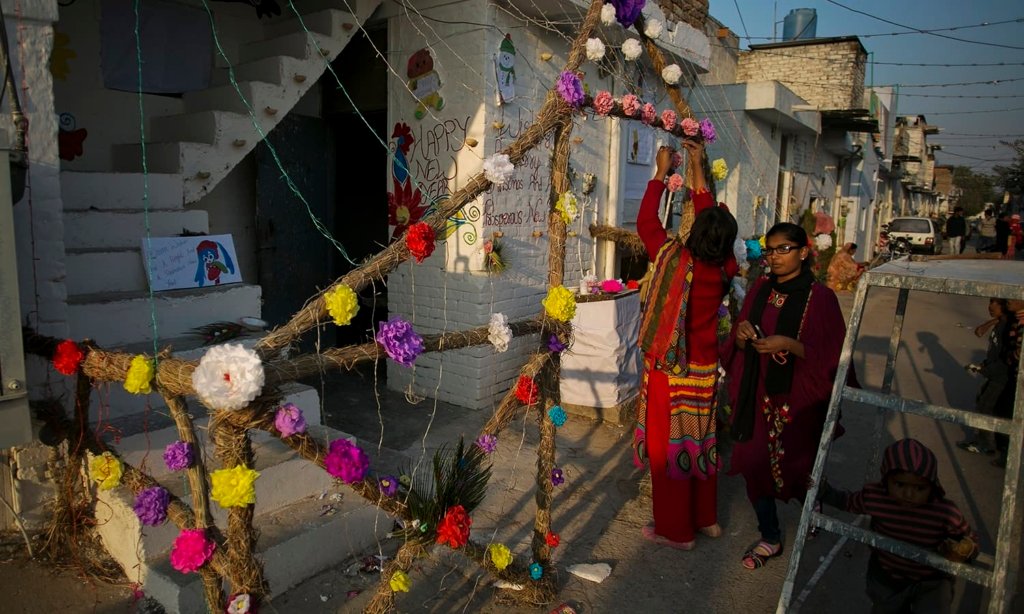Aasim Sajjad Akhtar
Christmas is hardly a big occasion in Pakistan. More than two million Pakistani Christians celebrate it guardedly, with few from the Muslim majority joining them. Government officials issue cut-and-paste statements and put up a Christmas tree or two in public places, and then return to the business of lending legitimacy to majoritarianism.
Indeed, Christians in this country usually make their way into the public consciousness when they are victims of lynch mobs or young girls from the community are forcibly converted and married off to Muslim men. So even if only in a symbolic fashion, let us acknowledge the humanity of the otherwise beleaguered Christian population and rejoice alongside them on the biggest day of their year.
Those who squirm at the thought of celebrating Christmas ought to introspect about why. Many Pakistani Muslims come into contact with Christians regularly, particularly in metropolitan centres. Those who are relatively affluent employ Christian women as cleaners inside their homes; while municipal authorities almost exclusively hire Christian men and women as ‘sweepers’ who clear gutters, roads and pretty much all public spaces of dirt on a daily basis.
Slightly further up the class ladder, Christians find work in hospitals as nurses and janitors — the ‘cleaning’ motif dominates here too. There are certainly Pakistani Christians involved in other occupations, but the point should be clear; they are hugely overrepresented in the ‘sweeper’ profession.
This has little to do with the Christian faith. It has to do with caste, one of the great unspoken facts of Pakistani society. One often hears the refrain that there is no such thing as caste in Pakistan because caste is associated with Hindu social structures and Muslims don’t ‘do’ caste. The rhetoric is completely out of touch with reality.
Caste is a feature of all South Asian societies, irrespective of whether Hindus, Muslims or Buddhists comprise the majority population. At the risk of oversimplification, caste is an ideology and associated set of material practices that deem certain human populations inherently superior/inferior to others. There are multiple gradations of caste, and ‘untouchability’ is arguably its most oppressive form.
Those who insist that untouchability is exclusive to India would do well to explain why certain Pakistanis — in villages, small towns and big cities — are confined to professions like ‘sweeping’. Why do the same populations who are pigeonholed in such professions often live in walled ghettoes, and even there constantly face eviction and dispossession? Finally, why do so many mansion owners who employ low-caste Pakistanis in their homes for a pittance refuse to shake their hands or share utensils? Because they subscribe, consciously or otherwise, to the principle of untouchability.
Across the Indian subcontinent, low caste untouchables — in India they are named Dalits — were converted by British missionaries during the colonial period. A new faith was presumed to be a vehicle to improved social status. But mobility proved elusive, in large part because the British Raj cruelly deployed caste, biradari, religion and ethnicity to divide and rule the subcontinent.
Christians are not the only community in Pakistan that suffer the daily indignities of caste-based oppression. Many Muslims are subjected to degrees of untouchability too. Take the caste known as Musallis in rural Punjab. Just like Punjabi Christians who remain subjugated even after migrating from the village, most Musallis who come to urban Pakistan in search of mobility and dignity remain locked into various forms of servitude.
There is caste amongst Pakhtuns, Sindhis, Baloch and virtually all other major ethnic-linguistic nations in Muslim-majority Pakistan. Suppressed histories prevent us from naming and struggling against caste hierarchies. But this does not mean that there is no consciousness of caste oppression or rage and resentment around it.
More generally, why are so many who consider themselves ‘secular’ and ‘liberal’ wilfully silent about caste and class privilege? I do not take for granted the few voices that speak out over the weaponisation of religion against Christian, Hindu and minoritarian Muslim sects. But what of the relatively banal but also deplorable manner in which low-caste Christians, Hindus and, indeed, Muslims are exploited as menial labourers, and deprived of the security of tenure in katchi abadis? Many young girls working as domestic servants are victims of sexual abuse and other forms of violence because of their class and caste background. The list is endless.
Indian politics has been transformed over the past three to four decades due to the politicisation of caste. It is not a panacea for the wretched of the earth, but naming hierarchical power relations is the first step to redressing them.
In the meantime, Merry Christmas to all who are celebrating. This Op-Ed article was originally published in Dawn.

Dr Aasim Sajjad Akhtar teaches at Quaid-i-Azam University, Islamabad. He is an author, political activist and public intellectual.

The High Asia Herald is a member of High Asia Media Group — a window to High Asia and Central Asia

